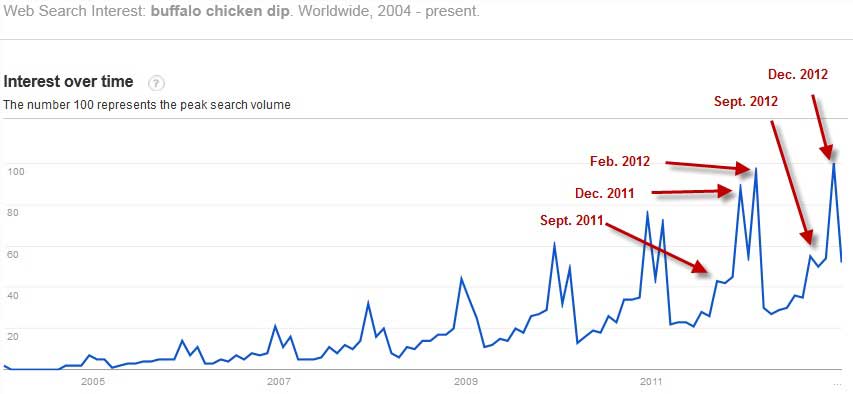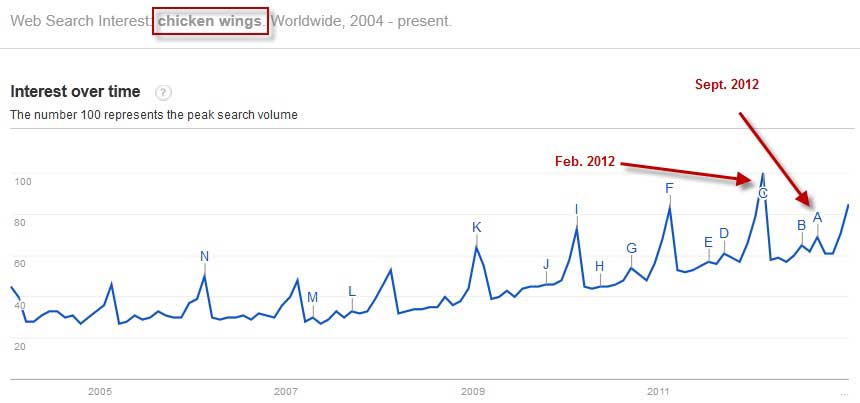New keyword research from WordStream (my company) suggests that buffalo chicken dip—apparently a dip made to taste like buffalo chicken wings—owes virtually its entire existence to Super Bowl Sunday and the NFL season.
We conducted extensive research into the seasonality and trends of keyword searches on Google corresponding to chicken wings and hundreds of other popular Super Bowl snacks, including the following: guacamole, chili, nachos, pulled pork, pigs in a blanket, doritos, and seven layer dip.
The study found a near perfect correlation between the demand for chicken wings and buffalo chicken dip with the NFL season.
For the last nine consecutive years, search volume for buffalo chicken dip increased significantly in September (which corresponds to the start of the NFL season), then peaked in December (corresponding to end of the regular season), and peaked again in February, corresponding to the Super Bowl:
The search volume for "chicken wings" increases approximately 75% every February, relative to the three months prior, though the snack has more steady demand compared with buffalo chicken dip.
Google estimates that Americans search for "Chicken Wings" approximately 550,000 times per month, on average.
Other Chicken Snacks Also Super Bowl Favorites
Other, similar keyword searches corresponding to chicken snacks exhibited similar trends, including for the following keyword searches: buffalo dip recipe, buffalo chicken recipe, chicken dip recipe, chicken dip recipes, chicken wing dip, and buffalo wing dip.
We can therefore conclude that in the event of an NFL lockout, the chicken economy would be in trouble!
What's Your Industry's Chicken Dip?
Every industry has its version of "buffalo chicken dip," a product or concept with big seasonal peaks. By carefully anticipating those keyword trends and having your search marketing campaigns at the ready, you could hatch the same kind of profits as chicken farms do on Super Bowl Sunday.
Four Seasonal Keyword Research Tips
- Use Google Trends. Google Trends is a great free tool for discovering trending and emerging keywords. Look for historical trends on keywords that have a link to your industry so you can drive seasonal traffic that's still relevant to your business. Use the forecast feature to anticipate future search volumes.
- Adjust PPC budgets accordingly: Increase campaign budgets for seasonal keyword campaigns in advance of peak volume to ensure maximum exposure and to beat the competition. To avoid overpaying, adjust back down when the season is over. Use the Google Traffic Estimator Tool (requires log-in) to get detailed estimates on impressions, clicks, cost per click, and total cost for a particular keyword, based on your budget, max bid amount, and other targeting options such as your location settings—to help you determine how much to raise or lower your budget.
- Build in plenty of lead time for SEO content. When attacking a seasonal trend via content marketing, start planning your content and outreach/PR plan at least several weeks in advance. If you wait until the Super Bowl weekend to write about the Super Bowl, you'll be too late to capture much traffic.
- Check out trending topics: If you're still struggling to find seasonal news topics, check out the trending topics page on YouTube or Twitter. On Twitter, you can check for local trends—for example, you can see what's trending just in your city, as opposed to around the country or worldwide.






